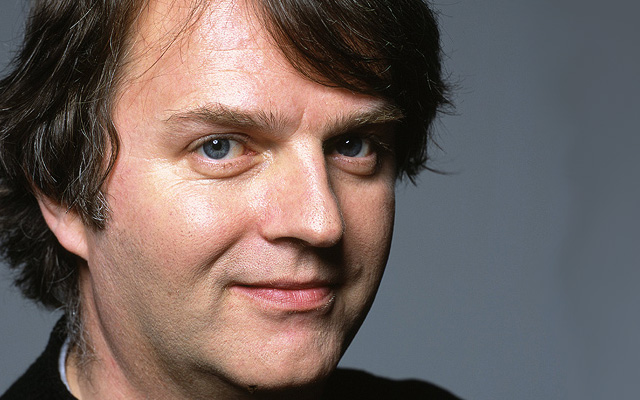
Why Just A Minute is so challenging
Paul Merton writes his first academic paper
Comedian Paul Merton and a Cardiff University academic have investigated why Radio 4 programme Just A Minute is so challenging for players.
The BBC show requires its celebrity panellists to speak fluently for one minute on a given subject, without hesitation, repetition or deviation.
Professor Alison Wray, an expert in linguistics, collaborated with Merton, one of the programme’s longest standing contestants, to write a paper for the journal Comedy Studies.
Their interest was how players manage to participate successfully in the game without experiencing too much "brain fry", or "cognitive overload".
Professor Wray, based at Cardiff University’s School of English, Communication and Philosophy, explains: "Brain fry is a colloquial term for mental fatigue or overload. It happens when we are trying to attend to too much at once. The rules of Just a Minute create a perfect storm of cognitive pressure, making it ideal for linguistic research.
"In regular speech, we aim to be fluent, so we don’t get interrupted and lose our chance to talk. We manage the flow of ideas and gain time while we plan what to say next, by inserting hesitation filler words, repeating material and putting in asides or deviations. But Just A Minute outlaws these options. Kenneth Williams described it as like ‘putting leg-irons on a sprinter.’
"Not only do the contortions of speaking fluently in these circumstances create high risk of brain fry, the players are also aiming to be amusing. Hesitation, repetition and deviation are all key devices for delivering comic material. The need to avoid their usual tools of the trade is another source of cognitive pressure."
The paper, which draws on game transcripts and recordings as well as many published accounts of how different players respond to these pressures, reveals that the cognitive burden can lead to strong emotional reactions, including anger, frustration and fear. Players try various tactics to avoid drying up, including speaking very fast or very slowly, elongating words, reproducing song words, parroting what the previous speaker said, and manipulating the topic towards something they know about.
In the paper, co-author Paul Merton explains that he has developed particular strategies to avoid brain fry, of which the most effective is reconceptualising the game away from something he has to win. Instead, he focusses on the needs of the audience and on keeping the game enjoyable and well-paced.
This is Merton’s first academic publication. It came about when Professor Wray approached him for insights into his techniques and they saw the opportunity to collaborate. In a previous paper, Wray showed that even in successfully completed full minutes of the game, Merton repeated over one third of his words, leading her to explore in detail which repetitions were not noticed or not challenged, and why.
She comments: "Working directly with Paul Merton in this publication made it possible to explore in more detail how he conceptualises the game and manages its demands. He is a very successful player, because he has learnt to construe the purpose of the game differently."
Merton said: "As somebody who never undertook further education - it’s fair to say that I’m university challenged - I was somewhat surprised when Professor Wray approached me to collaborate on an academic paper looking at the difficulties of playing the evergreen Radio 4 panel show Just a Minute.
"It’s mind-boggling to think that my efforts to entertain the audience, both in the studio and at home, may well prove to be useful in studying brain fry or cognitive overload. By attempting to keep my contributions fresh, I suppose I may have unwittingly adopted a useful ploy in helping to keep the brain fresh as well."
First broadcast in its current format in 1967, Just A Minute is the world’s longest running radio panel show. Merton has been a regular player since 1988. The show is recorded in front of a live audience and only minimally edited.
Four panellists take turns to try and talk for up to one minute on a topic given to them and are only able to repeat the words in the topic prompt. The other players listen for breaches of the rules and if they buzz in correctly, they receive a point and take over the topic for the remainder of the minute.
One speaker achieving a full minute is rare. Previous statistics have shown that by 2017, there had been 306 instances of panellists doing so. More than 10% (32) were achieved by Paul Merton, second only at that time to Kenneth Williams (66).
Professor Wray’s interest in Just A Minute developed from her previous research into how language is packaged to reduce cognitive load. She has published extensively on the use of formulaic language—prefabricated phrases and sentences used to easily say things we’ve said before and that we know others have heard before. Formulaic language, she argues, lets us save our processing capacity for the new and important parts of what we’re saying.
More recently, she has looked at how dementia, which reduces a person’s cognitive capabilities, changes how language is produced both by people with the condition and those who interact with them.
She comments: "While this paper is focussed on Just a Minute, there is a more general message. Paul’s strategy in the game is to dodge the brain fry by finding an alternative interpretation of the game’s purpose. This reminds us that if you are facing an impossible task, seeking a different way of looking at the problem may provide a solution that brings you success."
‘Brain fry’ in Just a Minute: the challenges of talking without hesitation, repetition or deviation, is published in Comedy Studies and available to view here.
Published: 29 Jul 2024






